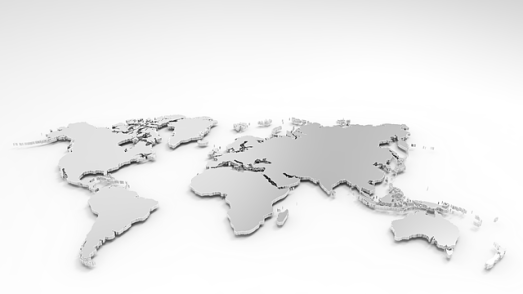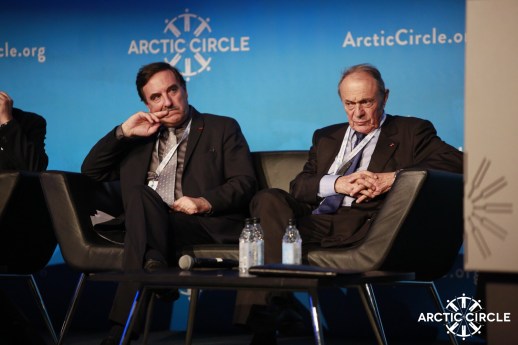
Numerous non-Arctic governments are also developing specific policy approaches to the far north, and at present the Arctic Council, (which is reportedly among the finalists for this year’s Nobel Peace Prize), includes thirteen observer governments with the possibility of others to follow in 2021. Among these observer states are large economies, (Britain, China, France, Germany, Italy, Japan, South Korea), with the economic and political means to help shape economic, environmental and political events in the far north, despite not having Arctic borders.
With the Arctic continuing to experience the results of climate change in a variety of ways, many non-Arctic states have also concluded that regulating the region to the periphery is no longer an option and that steps must be taken in order to better understand exactly what is happening in the planet’s northernmost reaches. Case in point, the Mosaic Expedition in the Arctic Ocean, led by the German vessel Polarstern, is currently drifting on an ice floe in the Laptev Sea in order to study local currents and glacial conditions. Nineteen countries are represented in the mission, including from diverse non-Arctic states including Belgium, China, Poland, Spain and Switzerland.
The past two months have also seen a number of policy papers released by non-Arctic governments, including from Germany and Scotland, and also last month from France’s Ministère des Armées, the country’s defence ministry. The document France and the New Strategic Challenges in the Arctic [pdf], (La France et les nouveaux enjeux stratégiques en Arctique), would appear to suggest that the French government of Emmanuel Macron, like that of Britain, Germany, and Japan, is beginning to view the Arctic through much more of a strategic lens, given global interest in the economic possibilities appearing in the region.
A 2017 strategic review [in French] conducted by the French defence ministry which suggested that due to resource competition and ice erosion, the Arctic ‘may one day become an area of confrontation,’ was reiterated in a 2019 paper. This included a quote from the late former French Prime Minister, and former Arctic Ambassador, Michel Rocard [in French], who compared the Arctic to a ‘second Middle East’.
However, in the preamble of the document, written by French Minister of Armed Forces Florence Parly [in French], there was also the extraordinary statement that ‘France wants to be a lucid voice against growing ambitions: the Arctic belongs to no one’, suggesting that the country, at least in some areas, was viewing the circumpolar north as an international space.

Regardless of how one interprets the French Arctic paper, the document is still another sign that the line between Arctic and non-Arctic states regarding issues of governance is becoming steadily more undefined, a trend which is unlikely to reverse itself despite pushback in some quarters.
US Secretary of State Mike Pompeo included in his controversial Arctic policy speech in May this year at the Arctic Council ministerial Meeting in Rovaniemi, Finland, the admonition that ‘there are only Arctic States and Non-Arctic States. No third category exists’. The statement was clearly directed towards Beijing and its stated concept of China being a ‘near-Arctic state,’ but at the same time the message also appeared to be directed toward other non-Arctic states that their role in regional affairs should be kept to a minimum at best. While the statement can be interpreted as yet another example of the Trump government’s penchant for liberally advocating walls and barriers to serve American unilateralism in foreign policy, the Pompeo speech could also be seen as reflecting the discomfort in Washington of a more multilateral approach to Arctic governance which may include contributions from non-Arctic actors.
Last week, President Trump held a joint press conference in Washington with his Finnish counterpart, Sauli Niinistö, which included discussions on Arctic politics and security. These topics were completely overshadowed by Mr Trump’s disjointed comments regarding the deepening Ukraine scandal and measures by the US House of Representatives to commence impeachment hearings against the president.
Nonetheless, the comments by both leaders regarding the future of the Arctic demonstrated both the resolve of the current US government to install a ‘keep out’ sign to non-Arctic states, while at the same time painting a picture of the United States as pivoting away from its Arctic neighbours in regards to views on regional security and politics. While President Niinistö spoke about the need to continue to prevent geo-political tensions from rising in the region, Mr Trump stressed freedom of navigation in the Arctic and added that, ‘Simply put, we believe that the affairs of the Arctic should be governed by the actual nations of the Arctic. And, as you know, there are other people coming into the Arctic, and we don’t like it. And we can’t let it happen, and we won’t let it happen.’

Also among the keynote speakers this year is Iceland Prime Minister Katrín Jakobsdóttir, and Antti Rinne, Prime Minister of Finland, as well as Dmitry Artyukhov, Governor of the Yamalo-Nenets Autonomous Okrug in Russia, and Rick Perry, US Energy Secretary, (who last week was cited, along with other American government officials, as being linked to the Ukraine scandal).
While much of the discussion at the meeting will be focused on environmental and socio-political events, the question of who has the authority to say what about emerging Arctic questions will likely not be far from the forefront of the proceedings.